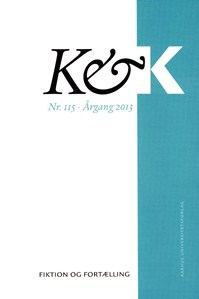POESIENS FIKTIONSLABILE ”JEG” - TEORETISKE OVERVEJELSER OVER DET LYRISKE JEGS FIKTIONSSTATUS
DOI:
https://doi.org/10.7146/kok.v41i115.15880Nøgleord:
Lyric poetry, narrativity, fictionality, identity, reliability, pragmatism, rhetorical narratologyResumé
THE FICTIVE-LABILE “I” OF POETRY | This article asks the question: what is the fictional status of the I-enunciation in a lyric poem? When people read a lyric poem in the first person, theytend to automatically assume that the poet speaks in her own voice. But is it okay to think of this as the “default setting” of lyric poetry? In this paper, two congenial essays are broached and both of them are used to enhance the other’s argument. The first essay is Susan Lanser’s “The ‘I’ of the Beholder: Equivocal Attachments and the Limits of Structuralist Narratology”. In this essay she deals
with homodiegetic fiction, and she tries to conjecture under which circumstances readers are likely to attach an “I” in a piece of literature to the “I” of the empirical author. She proposes five criteria which make the reader prone to infer attachment, and as she finds them almost always to be present in lyric poetry, she concludes that it is primed for authorial attachment. This article, however, finds it problematic that she presupposes that lyric poetry is a constant genre. To remedy this, Ralph Rader’s
essay “The Dramatic Monologue and Related Lyric Forms” is introduced. It distinguishes between four types of lyric poems based on the affinity or distance between the poet and the speaker in the poem. Lanser’s criteria are applied to each type of lyric poem. Rader, however, needs to incorporate reflections on how narrativity affects this poet-speaker relationship. Finally, the article presents a model which visualises and fuses the two theories, concluding that the “I” in lyric poetry is fictive-labile.
Downloads
Citation/Eksport
Gammelgaard, L. (2013). POESIENS FIKTIONSLABILE ”JEG” - TEORETISKE OVERVEJELSER OVER DET LYRISKE JEGS FIKTIONSSTATUS. K&K - Kultur Og Klasse, 41(115), 125–138. https://doi.org/10.7146/kok.v41i115.15880
Nummer
Sektion
Artikler
Licens
Tidsskriftet følger dansk ophavsret.





